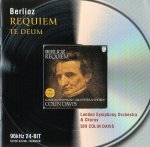Colin Davis gives one of the best overall performances of the Berlioz Requiem, but there are superior options if you value sonic spectacle over intelligent musicianship, fine solo and choral singing, and first-rate orchestral playing. It’s always tempting to dip into this work and sample the Dies Irae’s celebrated section involving the four off-stage brass bands (located at the cardinal points of the compass), a passage that’s widely used to demonstrate hi-fi set-ups. Davis’ 1969 recording won’t sound as impressive as the first-ever digital version of the work by André Previn (for EMI) with the London Philharmonic, or the late Robert Shaw’s underrated Telarc recording; but it’s a front-runner in performance terms. Davis reserves theatrics for the right moments, and he’s outstanding when it comes to expressing the gravity and seriousness of Berlioz’s score, as he proves most effectively in the choral pleadings of the Introitus and Kyrie. The unaccompanied Quarens me section shows just how disciplined Davis’ choirs are, but even here the recording doesn’t match Telarc’s for clarity. The Te Deum also receives a fine performance, with good solo singing from Franco Tagliavini (tenor) in the Te ergo quaesumus section. Philips includes David Cairn’s erudite notes on both works, and this is a disc that provokes deep reflection, so you’re unlikely to miss the apocalyptic impact of later digitally engineered versions.
































